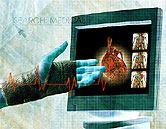 |
 |
 |

Studies Challenge Framingham Risk Score
The long-standing assessment for heart risk may not be accurate in some cases|
|
HealthDay
Friday, January 9, 2009
 THURSDAY, Jan. 8 (HealthDay News) -- Two studies, from the United States and the Netherlands, question the accuracy and value of the long-established Framingham Risk Score in predicting heart disease and cardiovascular death.
THURSDAY, Jan. 8 (HealthDay News) -- Two studies, from the United States and the Netherlands, question the accuracy and value of the long-established Framingham Risk Score in predicting heart disease and cardiovascular death.
The Framingham score, based on findings of a decades-long study in that Massachusetts community, allows doctors to assess risk on the basis of seven factors: age, gender, total blood cholesterol, HDL (good) cholesterol, smoking status, systolic blood pressure (the higher of the desired 120 over 80 reading), and whether blood pressure medication is being taken.
But use of that score did not accurately predict risk in a group of 1,653 people with no history of coronary heart disease, said a report in the January American Journal of Roentgenology. The study, by researchers at Yale University, measured the amount of potentially artery-blocking plaque seen on computerized tomography images.
While 21 percent of the people in the study were taking cholesterol-lowering statin drugs because of their Framingham scores, the scans showed that a quarter of those taking the medications had no detectable plaque, said Dr. Kevin M. Johnson, assistant clinical professor of diagnostic radiology at Yale, and lead author of the report.
"The rub is that the Framingham score is intended to talk about populations," Johnson said. "But the doctor in the office is faced by an individual patient who wants to know about his or her risk. If the doctor uses this Framingham score to assess risk for that individual patient, the results are not that good. If you look at 100 patients, it is accurate in a statistical sense, but that is epidemiology, not medicine."
The finding presents practicing physicians with a quandary, Johnson acknowledged, since it might mean exposing large numbers of healthy people to the X-rays needed to do CT artery scans.
"But one thing they shouldn't do is what the American College of Cardiology and the American Heart Association suggested in 2007, that if someone has a low Framingham Risk Score, you shouldn't do imaging of coronary arteries," he said. "This study suggests that that might be a mistake."
The second report, by researchers at Leiden University Medical Center and published online Jan. 9 in the journal BMJ, concerned a specific group of people not covered by the Framingham guidelines: those 85 and older.
The Framingham Risk Score did no better than chance in predicting the 108 deaths that occurred among the 215 women and 87 men who were followed for five years, said Dr. Wouter de Ruijter, a clinical researcher at Leiden and lead author of the report.
"The key word here is age," de Ruijter said. "The Framingham Risk Score is validated up to age 75. There have been signs in the medical literature that the classic risk factors such as hypertension and hypercholesterolemia [high cholesterol levels] were not performing that well for people with advanced age."
The new study "indicates that the traditional risk factors become blurred or wane with age," he said.
The only accurate predictor of cardiovascular death in the Dutch study was the blood level of homocysteine, an amino acid that is related to formation of fatty deposits in the arteries, the study found.
"At this point, many questions would have to be answered before we recommend measuring homocysteine in people at this advanced age," de Ruijter said. "And I do not know what kind of intervention we could offer these people. The results of homocysteine-lowering trials have been disappointing."
What the study does show is "a 10-year gap here" in the effectiveness of the Framingham Risk Score, he said. "The primary preventive strategy for people at an advanced age is unknown," de Ruijter said. "Measuring blood pressure levels and total cholesterol levels are not predictive any more."
HealthDay
Copyright (c) 2009 ScoutNews, LLC. All rights reserved.
Related News:
- More News on Coronary Artery Disease
- More News on Heart Diseases--Prevention
- More News on Seniors' Health
More News on this Date
Related MedlinePlus Pages:
| Home | Health Topics | Drugs & Supplements | Encyclopedia | Dictionary | News | Directories | Other Resources | |
| Disclaimers | Copyright | Privacy | Accessibility | Quality Guidelines U.S. National Library of Medicine, 8600 Rockville Pike, Bethesda, MD 20894 National Institutes of Health | Department of Health & Human Services |
Date last updated: 09 January 2009 |




